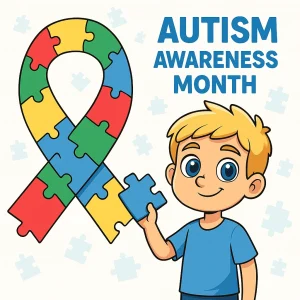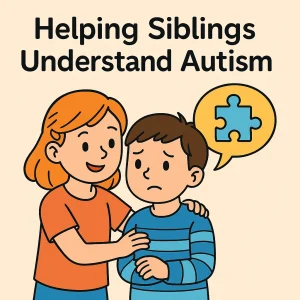5 Early Signs of Autism Every Parent Should Know
Last Updated: September 24, 2024
As a parent, you’re always keeping an eye on your child’s growth, from their first smile to their first steps. But what happens when those milestones don’t arrive as expected? While every child grows at their own pace, it’s important to be aware of early signs that could indicate something more, like autism.
Recognizing the early signs of autism is crucial. Early intervention can make a world of difference in a child’s development. Research shows that when developmental delays are identified early, therapies and support systems can be more effective, giving your child the best possible start.
It’s important to remember that no two children are the same. Some may hit certain milestones sooner, while others take their time. But when behaviors such as limited eye contact, delayed speech, or lack of response to their name persist, it may be worth paying closer attention.

5 Key Early Signs of Autism
1. Delayed or Infrequent Babbling
Babbling is one of the first ways babies start exploring language. Most babies begin to babble or make repetitive sounds like “ba-ba” or “da-da” around the 6-month mark. This is a crucial stage of development as they experiment with sounds that eventually form the basis of words.
However, if your child hasn’t started babbling by this time, or if their babbling seems infrequent, it could be a sign of developmental delay. One possible reason could be autism, as children on the autism spectrum may show delays in reaching speech milestones.
It’s important to remember that every child develops at their own pace, but keeping an eye on babbling and other early speech behaviors is essential. If you notice that your child isn’t babbling or making repetitive syllables by 6 months, it’s a good idea to consult your pediatrician or a developmental specialist.
Also Read: Toddler Speech Development: From Babbling to First Words
Developmental Signs vs. Autism Indicators Table
| Developmental Milestone | Expected Age | Typical Development | Autism Indicator |
|---|---|---|---|
| Babbling | Around 6 months | By 6 months, babies usually start making repetitive sounds like “ba-ba” or “da-da.” Babbling is the foundation of language development. | Lack of babbling, limited speech sounds, or reduced vocalizations may be an early sign of autism. |
| Responding to Name | 6-12 months | Babies typically start responding to their name when called between 6 to 12 months. This shows growing social awareness. | A child who doesn’t consistently respond to their name or seems to ignore it may have a developmental delay, including autism. |
| Eye Contact | Throughout infancy | Babies naturally engage in eye contact during interactions as early as the first few months of life. This helps with bonding and social learning. | Avoids or makes limited eye contact. Babies with autism may appear to focus on objects instead of people’s faces. |
| Gesturing (e.g., pointing/waving) | By 10 months | By 10 months, babies often start using gestures like pointing, waving, or reaching to communicate needs or share experiences. | Does not use gestures to communicate. A lack of pointing or waving by this age could be a sign of autism. |
| Social Smiling | 2-3 months | Social smiles are an early sign of emotional and social development. Babies smile in response to their caregivers around 2 to 3 months of age. | Rarely smiles in response to caregivers, even when prompted. Lack of social smiling may indicate developmental concerns. |
| Reaching Out to Be Held | 6-9 months | By 6 to 9 months, babies typically reach up to caregivers to signal they want to be held or need help. | Does not reach out or engage with caregivers when they want to be picked up. This could suggest difficulties with social bonding. |
2. Lack of Response to Their Name
By the time babies are between 6 to 12 months old, they typically start recognizing and responding to their name. This is a key developmental milestone that shows growing awareness of their surroundings and a deeper connection with caregivers.
If your child consistently doesn’t respond when you call their name, especially after 12 months, it may signal a developmental delay. One of the early indicators of autism is a lack of responsiveness to their own name. It could seem as though they are “tuning out” or engrossed in their own world, which can be concerning for parents.
There are simple ways you can observe this behavior during everyday activities:
- Mealtime: Call your child’s name when they’re focused on eating or playing with toys. Do they look up or acknowledge you?
- Playtime: While playing together, try saying their name in a playful or sing-song manner. Watch how they react—do they turn towards you?
- Outdoors: In a park or outdoor setting, see if they respond when called amidst distractions like other children playing.
3. Rarely Smiles When Approached by Caregivers
A baby’s smile is one of the most precious moments for parents, and it’s also a critical part of early social development. Smiling is one of the first ways babies engage with the world around them. By responding to their caregivers’ smiles, they begin to form important emotional and social connections.
However, if your baby rarely smiles when approached, or doesn’t engage in simple social exchanges, it could be a sign of developmental delay, including autism. Children with autism may not react to smiles, laughter, or other social cues as frequently as expected. This might leave parents feeling unsure, but it’s important to recognize this as one possible early indicator.
There are a few practical ways you can gently engage with your baby to gauge their reactions:
- Face-to-Face Play: Try playing simple games like peek-a-boo, where you can observe how your baby responds to your smiling face. Do they smile back or engage in the interaction?
- Gentle Mimicking: Babies often enjoy when parents mimic their expressions. Smile, and see if your baby tries to mimic you back. Lack of response might signal the need for closer observation.
- Everyday Smiles: Pay attention to how your child reacts when you smile at them during daily routines, like feeding or dressing. If their smiles are infrequent, consider discussing this with a pediatrician.
4. Poor Eye Contact
Eye contact plays a crucial role in early social development, as it’s one of the first ways babies connect with the people around them. When your baby looks into your eyes during interactions, it’s a sign they are beginning to understand social cues and form bonds.
However, many children with autism may avoid eye contact, which can be one of the early indicators of autism. If your child consistently looks away or seems to focus on objects rather than your face during conversations or play, it might be a red flag.
Here are a few natural ways to observe your child’s eye contact:
- During Feeding: Whether breastfeeding, bottle-feeding, or even at the dinner table, watch how often your baby looks into your eyes. Babies typically engage with their caregivers during these moments.
- Playtime: Notice your child’s gaze while playing games like peek-a-boo or reading a story. Do they meet your eyes during these activities?
- Routine Interactions: Simple everyday moments, such as dressing or bathing, are perfect times to observe your baby’s eye contact. If they consistently look away or seem disengaged, it may be worth paying closer attention.
5. Does Not Gesture to Communicate
By the time babies reach around 10 months of age, they typically begin using gestures like pointing at objects they want, waving goodbye, or reaching out for help. These gestures are their way of communicating before they have the words to express themselves.
However, if your baby isn’t using gestures to communicate their needs or desires, it might be an early sign of autism. Gestures like pointing to a favorite toy or waving when you leave the room are key indicators of social engagement and development. A lack of these behaviors could suggest your child is having difficulty with social communication.
Here’s what you can observe in everyday situations:
- Pointing to Objects: Does your child point to an object they want, like a toy or food, or do they simply wait for you to figure it out? Babies often point to things they’re interested in as a way to communicate.
- Waving: During social moments like saying goodbye or hello, notice whether your baby waves in response. Not waving or mimicking this gesture by 10 months could be a signal to look out for.
- Reaching for Help: Babies naturally lift their arms to ask to be picked up or reach for things they need. If your child doesn’t make this gesture when they want help, it could be a sign of developmental delay.
Conclusion
Being aware of these early signs of autism can make a big difference in your child’s development. If you notice behaviors like delayed babbling, poor eye contact, or a lack of gestures, it’s important to speak with a pediatrician or developmental expert. Early detection helps you take proactive steps to support your child’s growth and learning. Every child develops at their own pace, so noticing these signs doesn’t mean you need to worry—it just means you’re staying informed and ready to provide the right support if needed.
At Wellness Hub, we are here to help families navigate early intervention with expert advice and therapy services. If you’re looking for more information or need personalized therapy options, our team is ready to support you. Visit Wellness Hub to explore how we can assist you on your journey to ensuring your child’s well-being.
Frequently Asked Questions:
1. What are the early signs of autism in babies?
Early signs of autism in babies can include delayed babbling, poor eye contact, lack of response to their name, and not using gestures like pointing or waving. These signs often appear before the age of 12 months.
2. When should I be concerned if my child is not babbling?
If your child hasn’t started babbling or making repetitive sounds by 6 months, it’s a good idea to consult a pediatrician. Delayed babbling can be an early indicator of developmental delays, including autism.
3. Is it normal for my baby to avoid eye contact?
While some babies may avoid eye contact occasionally, consistent avoidance of eye contact could be a sign of autism. If this continues, consider speaking to a developmental expert.
4. How do I know if my child’s response to their name is delayed?
Typically, babies begin responding to their name between 6 to 12 months. If your child regularly doesn’t respond to their name by this age, it may be worth discussing with your pediatrician.
5. Why is my baby not gesturing, like pointing or waving?
Babies generally start using gestures such as pointing or waving by 10 months. A lack of gestures could be a sign of a developmental delay, including autism. Keep an eye on this behavior and consult a doctor if you’re concerned.
6. What should I do if I notice early signs of autism in my child?
If you observe any early signs of autism, like poor eye contact or delayed communication, it’s important to consult with a pediatrician or developmental specialist. Early intervention can help support your child’s development.
7. How early can autism be detected?
Autism can sometimes be detected as early as 18 months, though signs may begin to appear before then. If you have concerns, it’s best to reach out to a healthcare professional as early as possible.
8. Can a lack of smiling be a sign of autism in babies?
Yes, babies typically begin smiling socially around 2 to 3 months of age. If your baby rarely smiles when approached by caregivers or doesn’t engage in social exchanges, it could be an early sign of autism.
9. What does it mean if my child doesn’t respond to playful interactions like peek-a-boo?
If your child shows little interest in playful interactions, such as peek-a-boo, or doesn’t seem to enjoy engaging with you, it may indicate a developmental concern. Lack of interest in social play is often associated with autism.
10. How can early intervention help if my child shows signs of autism?
Early intervention, such as speech and behavioral therapies, can significantly support a child’s development. It helps improve communication, social skills, and overall learning, especially if autism or developmental delays are detected early.
About the Author:
Anuradha Karanam
Speech-language pathologist (7+ years of experience)
Anuradha Karanam is a skilled speech-language pathologist with over 6 years of experience. Fluent in Tamil, Telugu, Hindi, and English, she specializes in parent counseling, speech sound disorders, fluency assessment, and speech-language evaluations. Anuradha excels at working with children with developmental disorders, offering creative and effective therapy programs. Currently, at Wellness Hub, she holds a BASLP degree and is registered with the RCI (CRR No A85500). Her patience, ambition, and dedication make her a trusted expert in her field.
Book your Free Consultation Today
Parent/Caregiver Info:
Client’s Details:
* Error Message









